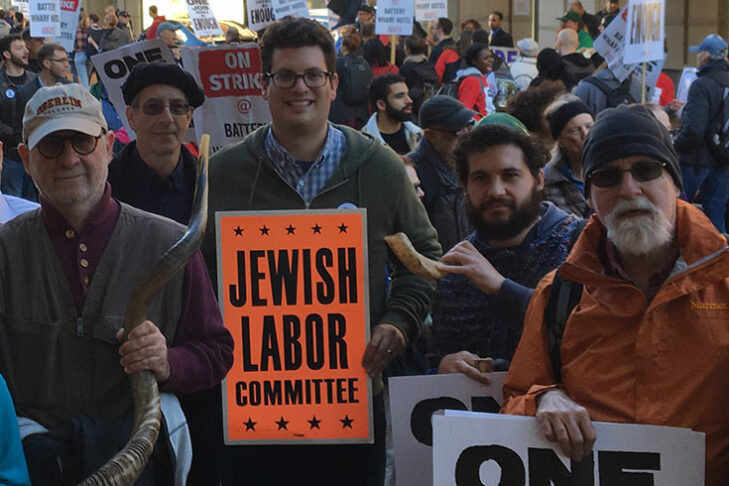This article is reprinted from The Jewish Experience, Brandeis University’s website devoted to Jewish issues.
As executive director of the New England Jewish Labor Committee (NEJLC), Ari Fertig, ’08, is sounding a clarion call to the Jewish community to support workers’ rights.
Rosh Hashanah is an “auspicious day, an opportunity for Jews to speak out for workers’ issues and on income inequality,” he said. “There’s an opportunity to match our values with action.”
The Boston-based NEJLC works to garner support among Jews for labor and acts as a bridge between the Jewish community and unions. It rallies community leaders and supports strikes and other labor actions. It recently created a pro-labor seder Haggadah and in July 2020, during the height of the COVID-19 pandemic, sponsored a Tisha B’Av memorial service to honor workers who had died from the virus.
Among NEJLC’s current causes are raising workers’ wages, especially in the restaurant industry, ensuring equity in the state’s response to the COVID-19 pandemic and pressing for a higher income tax on the wealthy to support education and public transportation.
In the weeks before the High Holidays, Fertig reached out to area rabbis and synagogue leaders, encouraging them to raise awareness about labor issues.
The NEJLC is the regional branch of the Jewish Labor Committee, a national organization founded in 1934 by Yiddish-speaking trade unionists to rescue Jews and European union leaders from the Nazis.
After the war ended, it refocused on domestic labor issues and civil rights. Its president, Stuart Applebaum, ’74, was recently involved in the unsuccessful effort to organize Amazon workers in Alabama.
Fertig grew up in Newton, Massachusetts, the son of Arnie Fertig, now a rabbi emeritus at Temple Beth Shalom in Melrose, Massachusetts, and Judith Shira Pinnolis, a former Brandeis University librarian.
In 2012, Fertig became a fellow at the Jewish Organizing Institute and Network (JOIN) for Justice, which trains Jewish leaders to organize for social change. The experience, he said, deepened his appreciation for the historic link between Judaism and social activism.
It was the first time, he said, that he began to think of Moses as a community organizer.
“I started to think of why I do what I do as a core part of my Jewish identity,” he said.
In 2017, Fertig watched in horror as the protesters at the Unite the Right rally in Charlottesville, Virginia, chanted antisemitic slogans. A year later came the Tree of Life synagogue massacre in Pittsburgh by a white supremacist.
“I recognized that being Jewish might feel very privileged, but the security of being Jewish is still very fragile,” Fertig said.
Soon after Fertig took the helm of the NEJLC in June 2019, he allied the organization with the One Fair Wage campaign, a coalition working to raise the minimum wage for service workers.
It supports the federal Raise the Wage Act that would gradually raise the federal minimum wage to $15 an hour.
It would also require employers to pay workers who make tips, such as waiters, minimum wage. Currently, they often make less than that because it’s assumed gratuities will make up the difference.
Restaurant employees in Washington, D.C., for example, can earn as little as $5 per hour before tips.
“It’s an outdated and unjust system that fosters income inequality, especially among women and people of color,” Fertig said.
By many accounts, the labor movement has suffered a series of devastating blows over the last year. The U.S. Supreme Court severely limited the ability of unions to organize workers. In the spring, the failure to unionize Amazon employees significantly set back the effort to organize workers at one of the country’s biggest employers.
But Fertig remains optimistic. He says there’s a growing focus by both conservatives and liberals on the working class.
“It is always a struggle in America to give workers a fair shake,” he said, “but we’re seeing a shift in attitude—workers are winning over the hearts of Americans who understand that the scales have been tilted toward the billionaires for too long.”
“Now is the time for a revitalized labor movement.”
This post has been contributed by a third party. The opinions, facts and any media content are presented solely by the author, and JewishBoston assumes no responsibility for them. Want to add your voice to the conversation? Publish your own post here. MORE



